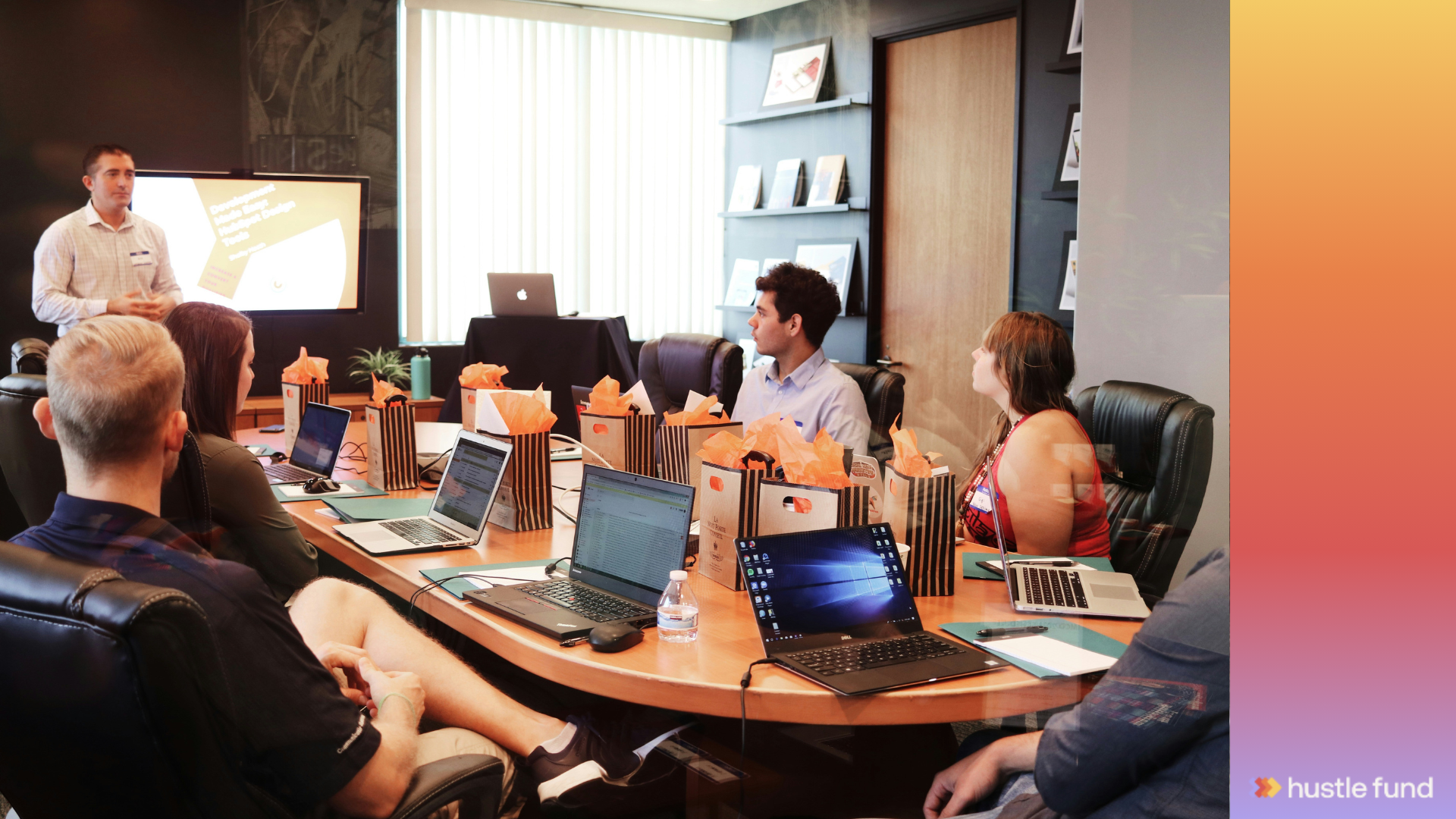Deal Flow 101: How to Accelerate Investment Velocity

Maya Caddle is a PM connecting global users across emerging and developed markets, from London to Nigeria to Hong Kong. She recently built a crypto company at Nestcoin and now is a Manager for Strategic Projects and Investments.
She’s also a Venture Scout for SHL Capital, Microtraction, and Hustle Fund, leading our deals in Africa. We sat down with Maya to explore her best practices as an investor-operator, covering:
- Maya’s personal angel investment criteria
- How to drive your efficiency as an investor-operator
- The potential of Africa's startup ecosystem
“It’s tricky to balance scouting on top of a full-time role, but it comes down to transparency, driving efficiency, and having high-quality deals in your pipeline.”
How to angel invest: Maya’s personal deal criteria
When scouting early-stage ventures, Maya tackles three basic areas of questioning:
- The strength of the team
- The size of the problem
- The viability of the business and its market
1. Evaluate the founding team
As with every enterprise — from one-person startups to the most established tech giants — everything starts and ends with the founder and their earliest team members.
Questions to broach include:
- Do those backgrounds set them up as the best team to solve this problem e.g. do they have the knowledge, skillset or network that will accelerate the growth of their startup?
- Understanding if and how they have pivoted and how their solution has evolved over time - ideas should be changing all the time, it is important to see whether and how the founding team are adapting to changing information whether that be from the market or their customers.
2. Define & scope the problem itself
As a potential investor, you should sufficiently understand the problem, the feasibility of the proposed solution, and how this functions within their broader market. Ask yourself questions like:
- Is this a serious problem that will still need solving in a few years' time and do the market trends suggest that this problem is likely to grow if left undressed?
- Is it a winner takes all market?
- Why haven’t other teams in the space successfully solved this yet?
3. Potential hurdles to growth & scalability
Finally, consider the viability of the business model for the long haul, through questions like:
- What might prevent this from scaling, whether that’s supply chains, marketability, etc.?
- Will this product be able to achieve some kind of flywheel?
- Are projected CACs sustainable?
If your operation doesn't lend itself to affordable acquisitions, you'll probably need to sustain yourself through constant fundraising efforts or driving immediate revenue.
Neither option is very viable, especially given the current state of the markets.
Leverage your network for domain expertise
Beyond these fundamental questions, Maya emphasizes leveraging your knowledge networks to bring in category experts where you lack experience.
On that note, Charles, CEO at Nuzo, adds: “Maya is the type of helpful, connected, and empathetic product leader VC needs more of. Maya and I connected over our shared passion for building Web3 in Africa. I was immediately impressed with the breadth and depth of her knowledge of the space and her willingness to drill down on granular UX details and then connect back to high-level product strategy.”
Charles takes this point further, pointing out: “When Maya shared her work as a scout with Elizabeth at Hustle Fund, taking the intro and subsequent investment was an easy decision.”
In the end, you’re one investor who can only know so many people, industries, histories, etc.
Gaining perspective from a well-versed connection in the space will only diversify and develop your experience level as a scout for the long term.
“Ultimately, you’re one investor who can only know so much. I’ll reach out to my connections in the space to cover the nuances only they can grasp.”
How to drive your efficiency as an investor-operator
Like countless angel investors, Maya balances her scouting work with her full-time job.
It’s a tricky tightrope to walk, mainly because it keeps her from being as hands-on. Her ideal workflow with a potential investment goes:
- See a quick pitch deck
- Have a follow-up phone conversation
- Refer them (or not) to one of her respective funds
- Work with the team to refine their pitch and be ready to pitch to the fund she referred them to
The last step is pretty crucial for the startup, especially if they’ve never pitched to a legit fund or sat down to practice their 20-minute delivery, the company’s narrative storytelling, etc.
It’s also an extra step that she takes upon herself, so every team she scouts can put their best foot forward. It’s been harder to juggle since her work at Nestcoin has picked up steam.
For other investor-operators, she advises being transparent about your availability with your full-time employer and your fund(s), plus leaning on your communities at both ends.
Beyond this, there are two tactical changes that have improved her efficiency.
1. Cultivate high-quality deal flow
Since finding greater success in scouting, Maya has shifted from primarily outbound efforts to inbound leads, reducing some of the workload.
For instance, other funds in the ecosystem often reach out when one of their investments has additional allocation. She will then focus on helping to fill the round instead of looking for new deals to pursue.
All of this results in saved time and energy.
2. Ask the right questions to filter efficiently
Today, Maya can see a deck and devise a short list of questions — similar to the rubric above — to quickly determine whether the startup is a good fit for any of her funds.
Being able to ask the right questions (depending on your investment focus areas) means being able to rapidly filter through your pipeline, which means a more manageable workload.
The valuable interplay of being an investor-operator
Investing as a full-time operator is inherently valuable because, to be an impactful scout or VC, you need to deeply understand what it looks and feels like to build something.
As a result, you’ll better empathize with founders and understand what’s feasible. That’s why countless prolific VCs can trace their careers back to a founding team role at a startup.
In Maya’s case: As a product lead at an African crypto startup, she can more easily identify, accurately assess, and scout other startups in the local space.
Of course, the reverse also applies. She’ll often go back to her day job at Nestcoin and evaluate: “From an investor’s perspective, what do we need to do to make this a viable business?”
“As an operator in the space, I know it’s not easy to build a crypto venture in Africa. This means I can ask founders more targeted, contextualized questions.”
The potential of Africa's startup ecosystem
Maya is currently Hustle Fund’s most active scout with a focus on the African continent.
Funnily enough, she can track her growth trajectory back to Hong Kong (not Africa), where she first fell in love with startups in emerging markets.
Many Asian countries’ venture ecosystems had already undergone immense development, meaning she’d missed out on the early growth opportunities of China, Singapore, India, etc.
However, this also meant she could learn from past markets. Maya turned her attention toward Africa, which, on top of her roots in the continent, caught her interest on three fronts:
- Population growth — Africa easily outpaces the West in population growth rates. This means notable development of a middle class, economic and purchasing powers, etc.
- A young population — Africa has the youngest population of the continents. Today, the median age is about 20 years old, which bodes well for future labor and capital markets, especially in comparison to Western economies supporting older generations.
- Industry trends — Amazon has announced an initiative to bring recruiters to Lagos, recruit local software talent, and pay for their relocation to an Amazon HQ.
Looking back, the economic rise of nations like China or India wound up reinventing the outdated narratives attached to the entire continent of Asia.
Looking forward, Maya anticipates the same happening for Africa and the international Black experience as the continent becomes a fundamental force in the global economy.
“I have deep faith in Africa’s global growth potential and significance. When I see these young, talented communities, it’s simply a no-brainer for me.”













